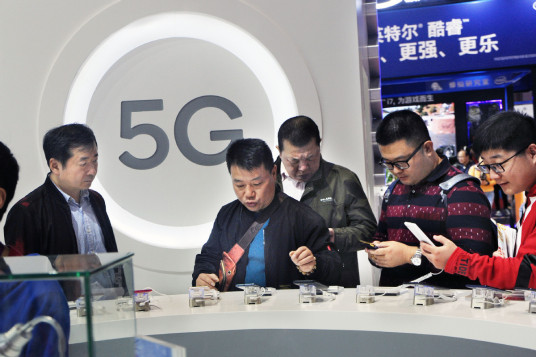Information consumption vital to China's economy
 |
|
An English teacher in the US interacts with a Chinese kid in Beijing during an e-class of the VIPKid, a Chinese online education platform. [Photo provided to China Daily] |
Information consumption has become a new engine for China's economy, playing a vital role in driving domestic demand, creating jobs and pushing forward industrial upgrades, People's Daily reported.
Last year, China's information consumption rose 11 percent year-on-year to 5 trillion yuan ($745.39 billion), accounting for 6 percent of the GDP, according to the Internet Society of China.
To further boost information consumption, the Ministry of Industry and Information Technology and the National Development and Reform Commission unveiled an action plan in August.
According to the plan, by 2020, China's spending on information consumption is expected to be 6 trillion yuan, with average annual growth of more than 11 percent. Information technology is estimated to drive 15 trillion yuan in related consumption.
Internet Plus
Resources like healthcare, education and culture are unmovable. However, internet blurs the boundary and allows people to access high-quality resources without leaving their home.
According to the action plan, China will promote Internet Plus in several sectors such as healthcare, elderly care, education and culture, to boost new consumption based on internet platforms, and develop online and offline coordinated consumption.
According to a report from the China E-commerce Research Center, in 2017, China's online education market was worth 240.2 billion yuan, up 53.97 percent from the previous year. The figure is expected to grow to more than 400 billion yuan in market scale in 2018.
The upgrade in information capacity usually brings about great changes, Wang Zhenzhong, an engineer from Alibaba Group, told the newspaper. "It will upgrade the former consumption and create new consumption sectors."
 |
|
A 5G-tech promotion stand at the first China International Import Expo in Shanghai. [Photo by Jin Rong/For China Daily] |
Increase speed, cut charges, promote 5G
China has been working to increase the access speed and reduce costs of internet services, which will be good not only for consumers but also for industrial upgrading.
The country's three telecom carriers -- China Mobile Communications, China United Network Communications Group and China Telecommunications Corp -- announced steps to scrap domestic long-distance and roaming charges from Oct 1, 2017, and cancel data roaming fees within the country starting July 1, 2018.
However, increasing speed and cutting charges doesn't bring less revenue for telecom operators. According to the Ministry of Industry and Information Technology, during the first half of last year, revenues from the telecom business rose 4.1 percent year-on-year to 672 billion yuan.
Mobile internet traffic jumped 199.6 percent to 26.6 billion gigabytes. Among them, internet usage via phones soared 214.7 percent to 26.2 billion gigabytes, accounting for 98.3 percent of the total.
Meanwhile, 5G is becoming a new bright spot. In December, the Ministry of Industry and Information Technology allocated specific low- and medium-frequency bands to the nation's three telecom carriers. Currently, these carriers are conducting 5G trial operations in a string of cities, enabling large-scale precommercial use.
According to the action plan, the country will speed up 5G research, and promote the construction of 5G network and demonstration projects, aiming to fully commercialize the superfast technology by 2020.
E-commerce poverty alleviation
In the wake of information consumption's development in China, e-commerce brings about a new idea for poverty alleviation in rural areas.
In recent years, some people sell local agricultural products nationwide via e-commerce platforms. It not only improves the livelihoods of impoverished people, but also contributes to the revitalization of rural areas.
According to the action plan, by 2020, 98 percent of administrative villages will have optical fiber internet access and 4G network coverage, helping more villagers out of poverty.
As China's economy turns toward high-quality development, the country has also quickened the pace of industrial upgrading.
Information consumption can optimize and improve industries, reduce costs and promote quality, Wang said, adding it's an important factor to boost industrial structure for higher quality development.
